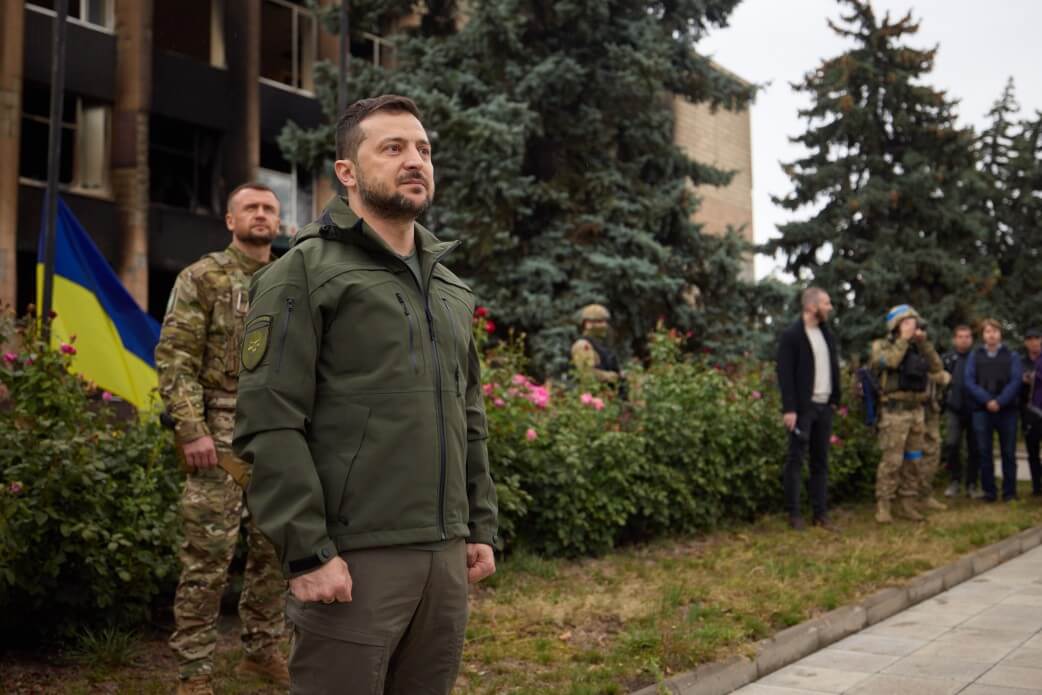On Tuesday, Russian State Duma Committee chair on International Affairs and leader of the Liberal Democratic Party of Russia (LDPR) Leonid Slutsky called Ukraine’s draft of legally-binding international security guarantees to defend itself against Russia an “escalation” and threatened the Western countries with nuclear warfare.
The head of the Ukrainian presidential office, Andriy Yermak, and former North Atlantic Treaty Organization (NATO) Secretary-General Anders Fogh Rasmussen, who co-chaired the international working group that drew up the document, presented the list of recommendations, including the establishment of the Kyiv Security Treaty—a document detailing a strategic partnership between Ukraine and guarantor states.
The guarantees proposal was drafted by @AndersFoghR & @AndriyYermak, who said armaments delays cost the lives of outgunned Ukrainian troops. “We need a military power strong enough to repel the Russians’ desire for revenge." https://t.co/e556YKR7PH
— Bojan Pancevski (@bopanc) September 13, 2022
Underlining that Ukraine needs security guarantees now, the document, titled the ‘Kyiv Security Compact (KSC),’ aims to mobilise “the necessary political, financial, military, and diplomatic resources” for its self-defence from a group of allied countries, such as the United States (US), the United Kingdom (UK), Canada, Poland, Italy, Germany, France, Australia, Turkey, and Nordic, Baltic, Central and eastern European countries. It also seeks the support of the broader Ukraine Defence Contact Group, comprised of countries like Japan and South Korea, for non-military guarantees like implementing snapback sanctions in the event of Russian aggression.
The KSC notes that the “strongest security guarantee for Ukraine lies in its capacity to defend itself against an aggressor under the United Nations (UN) Charter’s article 51” and thus needs to “maintain a significant defensive force.” “This requires a multi-decade effort of sustained investment in Ukraine’s defence industrial base, scalable weapons transfers and intelligence support from allies, intensive training missions and joint exercises under the European Union (EU) and NATO flags,” it says.
I said this at the meeting with journalists after the presentation of recommendations on security guarantees for Ukraine developed by the Yermak-Rasmussen International Working Group. pic.twitter.com/cW7eOFpCC5
— Andriy Yermak (@AndriyYermak) September 13, 2022
In this regard, Yermak celebrated how Ukraine has successfully resisted Russian forces but noted how “decisions often had to be made ad hoc, and the development of mechanisms for this assistance required a lot of time, which is always lacking in war and which is bought with pain, blood and lives.” “We need a military power strong enough to discourage the Russians’ desire for revenge,” he thus asserted. Furthermore, Ukrainian President Volodymyr Zelensky called the report a “crucially important step” that “should become the basis of the future security compact.”
Despite seeking security guarantees from allies, Yermak also made it clear that the document does not replace Ukraine’s “aspiration” to join NATO and is only a mechanism to ensure “iron-clad security guarantees” from predominantly—though not exclusively—NATO members.
These guarantees are not a replacement for Ukraine’s ambition to join NATO. This aspiration is safeguarded in the Ukrainian Constitution and is a sovereign decision for Ukraine.
— Anders Fogh Rasmussen (@AndersFoghR) September 14, 2022
This is about providing what Ukraine needs to defend its independence now and for the future.
Fogh Rasmussen, meanwhile, stressed that Ukraine’s victory against Russia is an immediate priority and that the adoption of the draft agreement would “send a powerful signal” to Russian President Vladimir Putin. He underscored that “these security guarantees should enter into force as soon as possible” instead of waiting “for an end to the conflict.”
The former NATO chief revealed that, under the deal, if Ukraine were attacked, “then at its request, the guarantors will have to gather for collective consultations within a very short time, for example 24 hours” and then take measures within 72 hours.
My counterparts 🇱🇹@GLandsbergis and 🇮🇪@SimonCoveney became the first foreign ministers to whom I presented the Kyiv Security Compact drafted by @AndriyYermak and @AndersFoghR. We will continue working closely with our partners to advocate solid security guarantees for Ukraine.
— Dmytro Kuleba (@DmytroKuleba) September 14, 2022
Ukrainian Minister of Foreign Affairs Dmytro Kuleba revealed that the document was presented to his Lithuanian and Irish counterparts, Gabrielius Landsbergis and Simon Coveney, during their meeting in Odesa on Wednesday.
In response, Russia condemned the document for once again underlining Ukraine’s NATO ambition, which Moscow considers to be its “main threat.”
They stress it’s “not the language of a potential peace treaty” nor a shelving of NATO ambitions.
— James Waterhouse (@JamWaterhouse) September 13, 2022
Ukraine is using recent military successes to try to lock down continued support.
Russian foreign ministry spokeswoman Maria Zakharova opined that the EU would “end up hellishly enslaved and subsequently never restore their economic growth and development, nor even their former glory” if it signed the KSC. She also pointed out that Ukraine is already receiving “non-stop” and “unprecedented” weapons and financial aid.
Similarly, deputy chairman of the Russian Security Council and former president Dmitry Medvedev claimed that the report was a “prologue to the third world war.” “No one will give any “guarantees” to the Ukrainian Nazis,” he stressed, asserting that “it directly concerns NATO’s hybrid war with Russia.” Medvedev also warned of nuclear warfare by saying that “sooner or later [Russia’s] military campaign will move to another level” if Ukraine continued to receive “the most dangerous types of weapons.”

